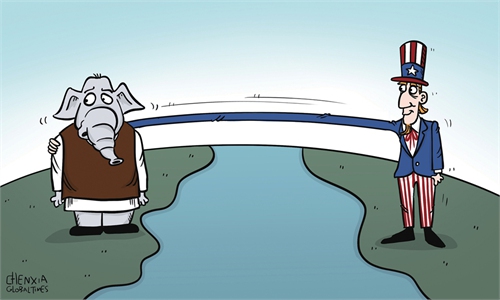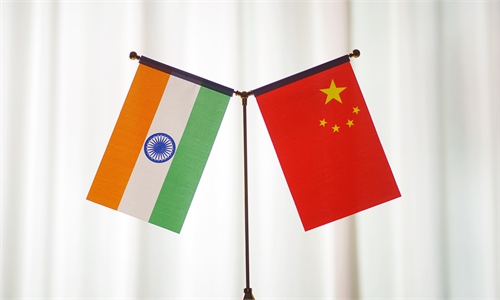
Vijay Prashad Photo: Courtesy of Prashad
Editor's Note:With the Ukraine crisis continuing, the West has spared no effort to persuade New Delhi to "stand with the West" to condemn Moscow. Is this another embodiment of the West's "colonial mentality" and "colonial structures and institutions"? Vijay Prashad (Prashad), an Indian Marxist scholar and Executive Director of Tricontinental: Institute for Social Research, shared his insights with Global Times (GT) reporter Lu Yuanzhi.
GT: Because of India's neutrality in the Ukraine crisis, many Western leaders have paid a visit to lobby New Delhi. Furthermore, Germany is debating whether to invite Prime Minister Narendra Modi to the G7 summit it will host in June. What's your take on the West's repeated pressure on India over the Russia-Ukraine conflict?
Prashad: India has refused to take a strong position around Russia's war in Ukraine. This is for several reasons. First, India and Russia have a long relationship that predates the government of President Vladimir Putin, that goes back to the time of the USSR. These diplomatic ties have only been strengthened in the past few decades. Second, 60 percent of India's imported weapons come from Russia, some of them are weapons systems that India has imported for decades. It is very difficult to pivot away from these systems unless India is willing to bear an enormous cost. Third, India buys energy from Russia, although as the Indian government has pointed out, India's energy purchases for a month are less than what Europe purchases from Russia in an afternoon. India's position is part of a global tendency - from South Africa to Brazil - of countries keen to revive a non-aligned platform. This is unforgivable in Washington, which seems keen to drive a two-camp attitude on the world, a division of the world into two camps reminiscent of the Cold War mentality.
GT: In recent years, the West has been getting closer to India. India-US relations have developed into a "global strategic partnership." What's your view of the West's purpose of getting closer to India? Do you think the West treats India as an equal partner?
Prashad: It is important to understand that the idea of the "West" is misleading. The United States sees itself as the most powerful country in the world, and it sees its G7 and NATO allies as merely instruments to extend the reach of US power. This US power is not merely to benefit US elites, but also to benefit the elites in the G7 states and those elites who are committed to getting as much out of the world through the US-driven globalization regime. Sections of India's elite, therefore, are aligned with the United States government and they do not want to see any gap between Indian and US policy. However, the Indian government has to confront the fact that there are several contradictions it faces: it relies upon countries other than the United States or the G7 states for trade, including for key resources such as energy and high-tech systems. So, the West would like to subordinate India but it runs up against these complexities. Even Germany and Japan cannot afford to break with Russia, and they are very close allies of the US than India is. Certainly, this structure of "alliances" shows us clearly that the United States does not treat subordinate allies such as India as equal partners.
GT: Are the clubs of the West worth India's membership?
Prashad: Frankly, the only club worth joining is the United Nations. We need to strengthen global institutions such as the UN and every country should abide by its Charter and by the treaties they have signed. Other clubs - as you rightly call them - divide humanity.
GT: After Russia's military operations in Ukraine, the West has constantly pressured China and India to condemn Russia with the West. Is this another embodiment of the West's "colonial mentality" and "colonial structures and institutions" as you once said?
Prashad: Yes, precisely. There is an attitude of lecturing other countries which must stop. We must find a way to build a generous practice of taking the opinions of other countries seriously and to ensure that countries feel secure that their own development path is not going to be suppressed by more powerful states. To be told how to vote and so on is an old habit of colonialism, which took away political sovereignty from the people of the world. It's important not only to have political sovereignty within one's country but to fight for the integrity of that sovereignty in international institutions. Anything less than robust political sovereignty begins to look like servitude.
GT: Does such "permanent colonial mentality" mean that the West will never stop lecturing developing countries such as China and India? What do you think the developing countries should do to deal with it?
Prashad: Developing countries need to reopen a serious conversation about the Bandung Spirit. In 1954, India and China agreed to the five principles of peaceful co-existence. This was the basis for the meeting the next year at Bandung and then it framed the establishment of the Non-Aligned Movement in Yugoslavia in 1961. The idea of "non-alignment" - a close concept of peace - allowed our countries some space to develop in the 1960s and 1970s. Non-alignment as a political practice weakened with the collapse of the USSR in 1991. It is important to fight for a robust non-aligned practice in our time. I believe that a conference needs to be held that should establish the history of this concept and its necessity in our time. We need to fight for the right to develop our own foreign policies without being told how to think and how to act by the old colonial powers.
GT: Some analysts believe the West's practices on repeatedly forcing India to take a side in the Ukraine crisis will lead India to reassess its ties with the West. What is your opinion on that?
Prashad: I believe that India's government is in a serious predicament. India has, over the past two decades, slipped into a very close relationship with the US, including strategic relations and then being part of the Quad. It would not be accurate to believe that India can adjust its ties too fundamentally. What is possible is that India will test the amount of autonomy it has from the US. We will have to wait and see how much latitude the US allows India and then see what reaction that will provoke from New Delhi.
I hope very much that countries such as India and China can come together with South Africa, Brazil and others to strengthen the Non-Aligned Movement and to advance the idea of non-alignment. Such a move forward would also provide the kind of necessary work at the UN to bring more democracy to that institution.



